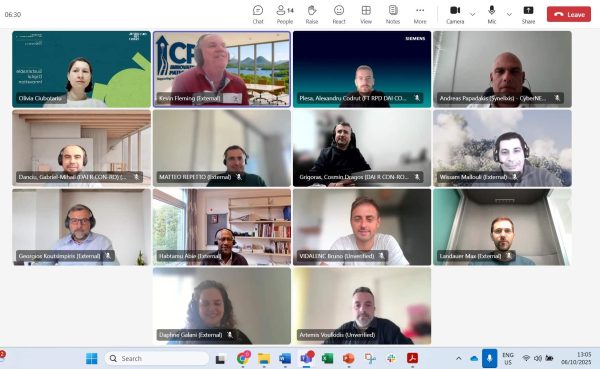At the beginning of October, the CASTOR project joined its fellow EU-funded cybersecurity
initiatives (CyberNEMO, INTACT, and MIRANDA) to establish the basis of collaboration
within the cybersecurity cluster. The gathering served as an important step in building
bridges across projects working toward the shared goal of enhancing Europe’s cyber
resilience through technological innovation, knowledge exchange, and coordinated outreach.
CASTOR was represented by Daphne Galani, the Project Coordinator, and Thanassis
Giannetsos, the Technical Coordinator, both from UBITECH.
Mr. Giannetsos presented the project’s vision and core innovations. A central focus of the
discussion was CASTOR’s goal: the establishment of Trusted Path Routing and Network
Trust Quantification. Leveraging Subjective Logic, the project is developing a Trust
Assessment Framework spanning across the Compute Continuum (CC), rendering it
capable of modelling complex and dynamic trust relationships and inferring trust values
based on diverse, yet sometimes conflicting, evidence collected from various sources. Along
with the CASTOR in-router trust enablers, providing the mechanisms for secure monitoring,
collection, and reporting of trustworthiness evidence, this approach establishes a CC-wide,
dynamic Trust Assessment Framework that allows the evaluation of the trustworthiness of
individual routing elements while simultaneously supporting more complex trust evaluations
that characterize entire routing paths. Mr. Giannetsos explained how CASTOR is tackling the
complex challenge of mapping trustworthiness metrics to network states, a foundational step
toward ensuring trust-aware traffic engineering in next-generation infrastructures.
Standardisation, a particularly complex yet crucial domain, emerged as a key area where
CASTOR’s expertise could synergize with that of other projects. CASTOR has made
important progress in standardisation through the IETF, where the consortium is defining
trustworthiness claims and attestation assertions to support secure onboarding and
decentralized decision-making in network routing. These contributions aim to ensure that
trust becomes a measurable, enforceable, and interoperable property within distributed
systems.
The meeting concluded with a broader dialogue on potential collaboration avenues across
the cluster, from joint participation at major events such as European Cyber Week (where
Montimage, a consortium partner in INTACT, has invited all projects to co-exhibit) to shared
dissemination activities, white papers, and engagement within the European Cluster for
Securing Critical Infrastructures (ECSCI).
As the cybersecurity cluster moves forward, CASTOR remains committed to fostering cross-
project collaboration and advancing the European vision of a trusted, zero-trust digital
ecosystem, where every connection, from edge to cloud, is secure by design and verifiable
in execution.

